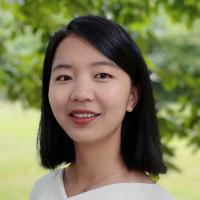Alumni Change Lives
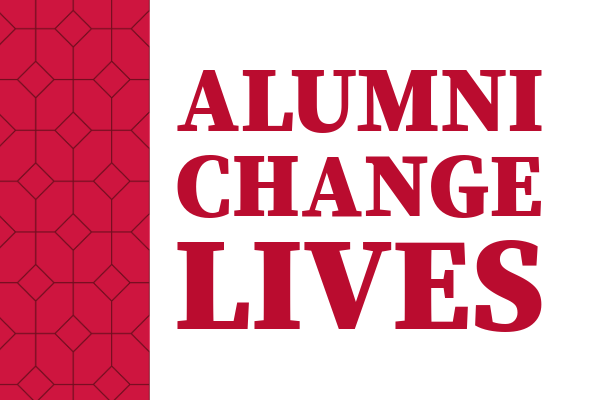
Thanks to funding from the Friends of Orton Hall (FOH), nine graduate students had the opportunity to travel globally for conferences and fieldwork in the summer and fall of 2024. They presented research, explored scientific frontiers, observed the Earth, and expanded opportunities for their careers. Below, our students share their experiences, accomplishments, and gratitude for the generous support of our alumni through FOH funds.
Connor Hopps
PhD student advised by Dr. Jill Leonard-Pingel
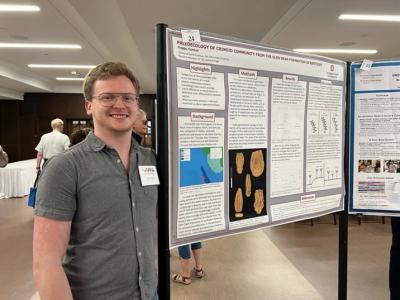
I presented my research at the 2024 North American Paleontological Convention with the support of FOH. During the convention, I discussed our lab group's work to develop fossil kits in conjunction with the survey to broaden paleontological outreach. I also presented a poster on my research concerning a Paleozoic crinoid community from Kentucky. FOH helped immensely during this professional excursion, funding my living and travel costs.
Lucas Carter
PhD student advised by Dr. John Olesik
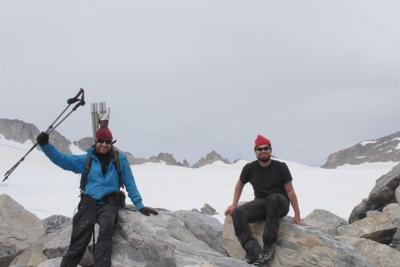
The Summer 2024 Friends of Orton Hall award allowed me to complete fieldwork to collect ice core samples from the Upper Fremont Glacier in the Wind River Range of the Rocky Mountains, Wyoming. The ice core samples collected from this expedition will provide a unique century-scale archive of natural atmospheric PM2.5 and anthropogenic atmospheric PM2.5 (an atmospheric particle less than or equal to 2.5 microns in diameter) pollutants such as mercury, lead, bismuth, and thallium occurring within interior North America. The information obtained in this study will allow us to better understand the contribution of natural and anthropogenic atmospheric PM2.5 over time, their sources, and how they interact with and influence Earth and human systems. During this fieldwork expedition, I gained valuable experience using a manual hand auger to collect ice core samples from the glacier. Conducting this fieldwork allowed me to observe first-hand the glacial features (such as glacial cirques) I have learned about throughout my coursework. Attached is a photo of Stanislav Kutuzov and me after reaching the Upper Fremont Glacier!
Zhaozhe (Frank) Chen
PhD student advised by Dr. Ozeas Costa
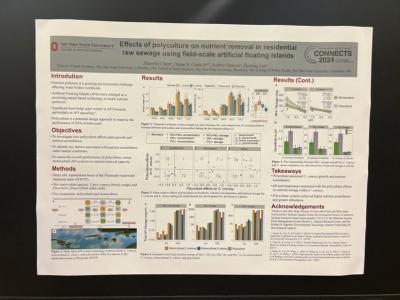
I presented my poster titled “Effects of polyculture on nutrient removal in residential raw sewage using field-scale artificial floating islands” at the Geological Society of America (GSA) Connects 2024 in Anaheim, California. My poster highlights how incorporating multiple plant species in polyculture can enhance the nutrient removal efficiency of field-scale Artificial Floating Islands (AFIs). The findings shows that increased plant diversity improves both the stability and overall nutrient assimilation capacity of AFIs under natural conditions. I am grateful for the financial support from FOH, which allowed me to present my work, receive valuable feedback from peers, and connect with potential postdoc and faculty opportunities, greatly contributing to my professional development.
Emi Chongsiriwatana
Undergraduate student advised by Dr. Ozeas Costa
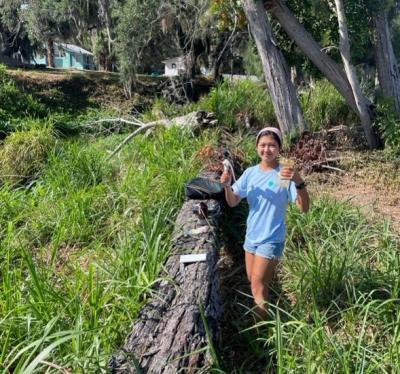
This summer, I performed research on Philippi Creek in Sarasota, Florida. This research aims to assess the impact of land use and hydrology on the water quality in the longest stream draining into Sarasota Bay. Thanks to FOH funds, I had the necessary field instruments and equipment to collect my water samples. With the guidance of my research advisor, Dr. Ozeas Costa, I collected water samples from 9 fixed sites along the Creek weekly over 12 weeks. I am analyzing my samples at Ohio State and am excited to share my final results with you all soon.
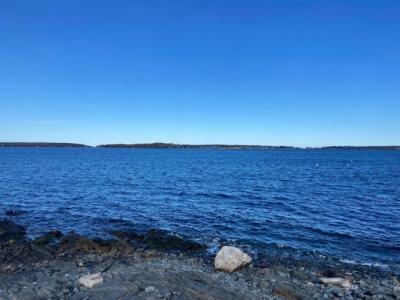
Kara Lamantia
PhD candidate advised by Dr. Lonnie Thompson
FOH provided me partial funding to cover the cost of my flight and enabled me to travel to Portland, Maine, this past May and attend the ICECReW workshop for Early Career Researchers and the U.S. Open Ice Core Meeting. I could interact with other ECRs in the ice core field, sit through several new talks, and attend sessions about prepping for a post PhD job. I am now on the organizing committee for the ICECReW workshop and am excited to help contribute to the 2025 meeting.
Mara Figueroa Berrocá
Postdoctoral researcher
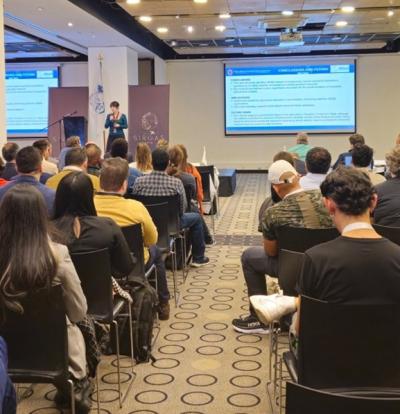
I traveled to Bogotá, Colombia, to attend the Geocentric Reference System for the Americas (SIRGAS) Symposium 2024. I participated in an oral presentation titled "An Empirical Formulation to Determine an Earthquake’s Area of Influence for GNSS Trajectory Modeling". This opportunity allowed me to present my research to key decision-makers and expand my professional network, all while contributing to the geodetic capacity-building efforts in developing countries across the Americas. My participation in this Symposium would not have been possible without the support from the Friends of Orton Hall award.”
Faye Higgins
MS student advised by Dr. Derek Sawyer
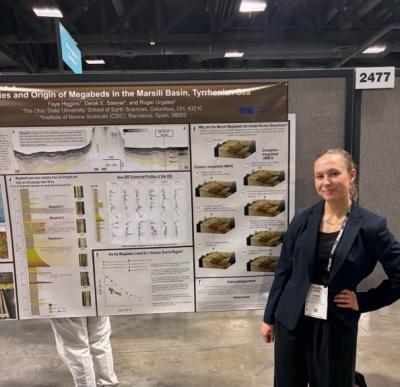
This past December, I had the opportunity to present the findings of my master's research at the American Geophysical Conference in Washington, D.C. At the conference, I got to talk about my research with industry professionals, academics, and fellow students. I want to thank Friends of Orton Hall (FOH) for their generous support, which made this incredible experience possible.
Fawz Naim
PhD student advised by Dr. Ann Cook
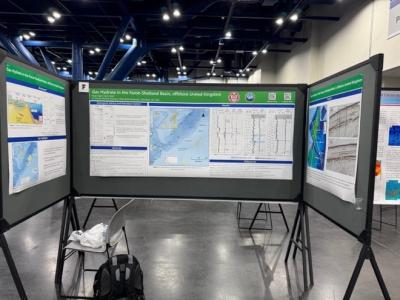
FOH funded me to present my research at IMAGE 2024 in Houston. My research focused on Gas Hydrate assessment in the Faroe-Shetland Basin in offshore UK. This is the first study on gas hydrate in this region, and I could present the results as a poster at the conference. This helped me communicate my research findings to geoscientists working in the energy industry and network and learn from what others presented at the conference.
Franco Sobrero
PhD student advised by Dr. Demián Gómez
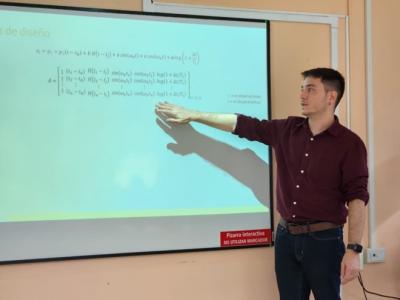
I traveled to Costa Rica with Professor Demián Gómez and Mara Figueroa Berrocá to teach a five-day course on "Non-linear Deformation Models Using GNSS Data" at the School of Topography, Cadaster, and Geodesy of the National University of Costa Rica (UNA). Led by Professor Demian Gomez, this workshop was an excellent opportunity for us to gain hands-on teaching experience and learn about organizing a multi-day course. Additionally, as a member of Working Group 2 of the Geodetic Reference System for the Americas (SIRGAS), I was allowed to contribute to geodetic capacity-building efforts in the Americas. Our participation in this training course would not have been possible without the support from the Friends of Orton Hall award.

